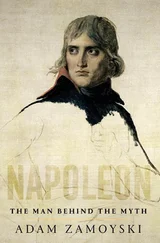It is unlikely that Buonaparte’s feelings for Désirée were profound. Yet he did kindle strong feelings in her. Her surviving letters and drafts exude all the passion and sentimentality one would expect of a lovelorn teenager. When he left for Paris in May she spelled out her desolation, assuring him that every instant they were apart pierced her soul. ‘The thought of you is with me always, and will follow me to my grave,’ she wrote shortly after his departure, her only consolation the knowledge that he would always be faithful. She hoped he would not find the Parisian beauties too alluring, and reassured herself that ‘our hearts are much too closely united for it ever to be possible for them to separate’.30
Shortly after his arrival in Paris, Buonaparte wrote saying that although he had met some ‘pretty and very charming women’ at Châtillon, none could compare with his ‘sweet and kind Eugénie’. He wrote two days later, sending her some songs, and again three days after that, with more sheet music, chiding her for not writing more often. On 14 June, on hearing that she had moved to Genoa with her brother and sisters, he wrote a long and barely coherent letter reproaching her for letting him down.31
He had made her promise that she would wait for him in Marseille, and her leaving made it impossible for them to see each other. A French citizen who went abroad was liable to be labelled an émigré and proscribed. For a serving officer to do so was tantamount to treason. Her going to Genoa suggested that her family were opposed to their marriage, and he saw it as a betrayal on her part. In an emotional letter of 14 June, Buonaparte assumes that their liaison is over while expressing the conviction that she will always love him. Feigning noble abnegation, he expresses the hope that she will find one worthier than himself. In a welter of self-deprecation he describes himself as a being cursed with ‘a fiery imagination, a cool head, a strange heart and an inclination to melancholy’, who is ‘surrounded by the savagery and immorality of men’, believes himself to be ‘the opposite of other men’ and despises life. Yet he insists that he can only find happiness in her love, and begs her to find a way for them to be reunited. ‘There is nothing I will not undertake for my adorable Eugénie,’ he affirms. ‘But if fate is against us think only of yourself and of your own Happiness: it is more precious than mine.’ Perhaps significantly, that was the day he resolved not to join the Army of the West and extended his sick leave.32
He wrote again ten days later, complaining of her silence and assuring her that although Paris was brimming with pleasures of every kind he could think only of his Eugénie and consoled himself with looking at her portrait, promising to send her his own. The same day in a letter to Joseph he wrote that ‘if the business with Eugénie is not concluded and if you do not send me any funds with which to operate, then I will accept the post of infantry general and go with the Army of the Rhine to seek my death’. He intimated that the engagement was broken off and suggested that as she would not want the portrait he had sent, Joseph should keep it for himself. She continued to cover notebooks with his name and initials, but there is little doubt her family wanted no more to do with him, and he too now had other things on his mind.33
‘So there we were the three of us in Paris,’ recalled Marmont. ‘Bonaparte without a job, me without any formal permission, and Junot attached as aide de camp to a general whom they did not want to employ […] passing our time at the Palais-Royal and at the theatres, having very little money and no future.’ Money does not in fact appear to have been a major problem; Buonaparte may have been on half-pay, but that did represent a regular income, and Junot, who came from a comfortably-off family, received subsidies from his father. Their future was indeed uncertain; Buonaparte’s military career had stalled and his political connections were not influential enough to restart it.34
Barras had opened a new world to Buonaparte by introducing him to those who set the tone in Paris. Chief among them was the great beauty, the daughter of a Spanish banker, Thérèse de Cabarrus, known as ‘ Notre Dame de Thermidor ’ because the revolutionary Jean-Lambert Tallien had fallen in love with her, freed her from prison and then helped bring down Robespierre and end the Terror in order to save his own as well as her neck. Other social lionesses included Juliette Récamier, Aimée de Coigny, Julie Talma and Rose de Beauharnais, as well as the more intellectually prized Germaine de Staël and older, more experienced ladies such as Mesdames de Montansier and Château-Renaud. They were seductive, sophisticated and assertive women who did as they pleased, and Buonaparte’s references in letters to Désirée and to Joseph leave no doubt that he was fascinated and excited by them.
He cut a poor figure with his small stature, lean and sallow features, hungry look and worn clothes, and he had no idea of how to present himself, how to enter a room, greet people or respond. His manner was farouche, a mixture of shyness and aggression that baffled people. While it could be appealing to the provincial girls he had encountered up till now, it grew disagreeable when he became defensive. He was particularly awkward with sophisticated women, and gave the impression of not caring what they thought of him. He was out of his depth, not so much socially as in terms of simple human communication: he showed a curious lack of empathy which meant that he did not know what to say to people, and therefore either said nothing or something inappropriate.
His gracelessness, unkempt appearance and poor French, delivered in staccato phrases, did not help. Laure Permon, in whose parents’ house he and Junot found a second home, thought him ugly and dirty. Bourrienne’s wife found him cold and sombre, and little short of savage. He could sit through a comedy with them and remain impassive while the whole house laughed, and then laugh raucously at odd moments. She remembered him telling a tasteless joke about one of his men having his testicles shot off at Toulon, and laughing uproariously while all around sat horrified. Yet there was something about his manner that some found unaccountably attractive.35
The sophistication of the liberated ladies both attracted and repelled him. They made Désirée seem provincial and uninteresting on the one hand, yet pure and sublime on the other. But the ardent love of a virginal teenager would not stand up to the sensual draw of the more sophisticated older woman, particularly in a young man who was still a child craving a mother figure. It seems he made a pass at Thérèse Tallien, who rebuffed him but apparently retained a fondness for him, as he was welcome in her salon, and she even used her contacts to obtain some cloth for him to have a new uniform run up. He appears to have been more successful with other women, perhaps including Letizia’s childhood friend Panoria Permon.36
He was feeling sorry for himself. On 5 August he wrote to the Committee of Public Safety complaining that his merits and devotion to the Republic had not been recognised. A few days later he admitted to Joseph that he was ‘very little attached to life’, and suggested he might as well throw himself under a passing carriage. Those are not the only things he said and wrote which suggest that he did on occasion contemplate suicide.37
With little else to do, he spent whole days at the Bibliothèque Nationale, established in 1792 with the amalgamation of the old royal library and the noble and ecclesiastical libraries seized during the Revolution. He was not only reading, as he always did when he had time on his hands. He was also writing.
Читать дальше












